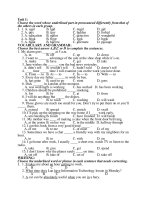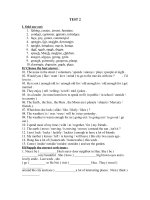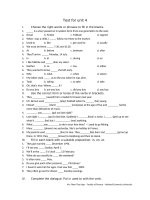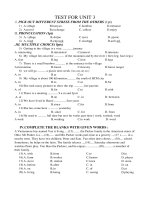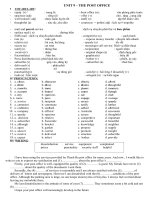PRACTICE TEST FOR UNIT 1
Bạn đang xem bản rút gọn của tài liệu. Xem và tải ngay bản đầy đủ của tài liệu tại đây (93.16 KB, 9 trang )
UNIT 1: FAMILY LIFE
SECTION A: VOCABULARY AND GRAMMAR
I. Choose the best answer
1. Women whose husbands do not contribute to household chores are more vulnerable to illness. The
underlined word has the closest meaning to:
A. happy
B. easy to be hurt
C. hard
D. friendly
2. Tom: “Which of the chores do you dislike doing the most?’’
— Jerry: “ .................. ”
A. I like cooking and sweeping the floor.
B. I do the laundry, cook and wash the dishes.
C. Well, my favorite activity is doing the washing - up.
D. Washing the dishes, because I often break things when I do the washing - up.
3. As a housewife, she stays at home and................her children. She takes care of them, feeds them
and protects them to develop.
A. nurtures
B. nurture
C. nature
D. natures
4. It is unfair to state that a woman’s job is to look ... everyone in the family and takes care .............
the house
A. in – on
B. After – in
C. Of - of
D. after – of
5. “The lecturer splits the students into four groups” has the closes meaning to:
A. The lecturer divides the students into four groups.
B. The lecturer divided the students into four groups.
C. The lecturer goes into four groups of students.
D. The lecturer went into four groups of students.
6. “They equally share the parenting” has the closest meaning to:
A. They are all unemployed.
B. They take care of each other.
C They come back home at the same time.
D. They share the housework and childcare evenly.
7. ..............is the state where things are of equal weight or force.
A. Balance
B. Changing
C. Moving
D. Importance
8. David’s part I time job requires a lot of .............. .Therefore, he usually carries the boxes weighing up
to 50 kilos and he needs effort and energy to move them.
A light lifting
B. easy carrying
C. heavy lifting
D. simple chores
9. According to a survey, a lot of young people prefer to live in ............... families which consist of
parents and children.
A nuclear
B. extended
C. three generation
D. four generation
10. The .............family, which consists of three or even four generations, is only popular in some
regions today.
A nuclear
B. extended
C. intended
D. small
11. Do you have to do .................?
A. the mess
B. your bed
C. the washing-up
D. the cook
12. Do you have to ....................... the rubish out?
A. take
B. make
C. empty
D. do
13. My mother .................. the responsibility for running the household.
A. holds
B. takes
C. runs
D. bears
15. We share the house with our grandparents and our uncle’s family. It is a(n) ................ family.
A.nuclear
B. extended
C. crowded
D. multi-generation
16. Are you free on Sunday evening? I’d like to ................. to the cinema.
A. ask you
B. ask out you
C. ask you out
D. ask you away
17. My mother is good at .......................... her time between work and family.
A. leaving
B. spliting
C. sharing
D. taking
18. When a couple can ................ chores in a way that both spouses feel satisfied with the outcome,
they are showing mutual respect for one another.
A. cut
B. run
C. take
D. divide
19. The children, all three, have done .................., mopped, dusted, helped on the house and in the
yard.
A. laundry
B. clothes
C. groceries
D. rubbish
20. Our parents .................... hands to provide for the family and make it happy.
A. were joining
B. are always joining
C. join
D.joins
II. Match each word/ phrase on the left with its description on the right
1. vulnerable
a. being of equal weight or force
2. nurture
b. consisting of three or even four generations
3. extended family
c. needing effort and energy to move
4. heavy lifting
d. taking care of, feeding and protecting
5. balance
e. easy to be hurt
III. Mark the letter A, B, C, or D on your answer sheet to indicate the underlined part that needs
correction
1. As the air is rising (A), it becomes cooler (B) and the water vapor inside it (C) changes into dropers
of (D) water.
2. From (A) the graphs, we can see (B) that the number of employees employed (C) by this firm
increase (D) each year.
3. I wear (A) casual clothes because we (B) are having a (C) party at (D) lunch time.
4. Average (A) family size has increased (B) from (C) the Victorian era.
5. They prefer to stay (A) in (B) their home (C) country because (D) family ties.
6. Dietitians urge people to eat (A) a banana (B) a day to get potassium enough (C) in their diet (D) .
7. Woody Guthrie has written (A) thousands (B) of songs during (C) her lifetime, many of which (D)
became classic folk songs.
8. My father is a good (A) family man, completely (B) devoted (C) for (D) his wife and kids.
9. My mother is cooking (A) something in the kitchen now (B). It smells (C) vers wel L (D).
10. We don’t have many (A) time for (B) lunch. After (C) lunch, we go back to work (D) immediately.
IV. Word formation: Give the correct form of the words in brackets
1. To be fair, we need to divide the tasks ............................ (equal)
2. My mom and dad are checking the ............... for their gold wedding anniversary. (prepare)
3. Heavy lifting is an action which requires ............... strength. (physic)
4. It is good for them as individuals and good for all the .................. within the family. (relate)
5. ......................say that a lot of young people are not aware of these advantages. (psychology)
6. Her ........... .............. to the company is enormous. (contribute)
7. In order to maintain peace, we should not be ............... of each other. (criticize)
8. I want to see the very cute and lovely children at …............. schools. (nurse)
9. Mary and her husband always join hands in ...................... their daughters. (educate)
10. A person will be considered .....................if he or she does not take good care of his or her parents
or grandparents. (grate)
V. Complete each of the sentences with an appropriate preposition
1. Will you take responsibility …………….. arranging the food?
2. As I am now in my final year …………….. the secondary school, I am …under……. a lot of study
pressure.
3. Can you give me a hand ……….. loading the van?
4. We are very close-knit family and very supportive …………. one other.
5. Please will you all join …………… me ………….. singing the national anthem.
6. Whenever problems come ……………., we discuss them frankly and find solutions quickly.
7. Women’s responsibilities is to look…………… the family.
8. The children are very excited …………. their camping holiday.
9. Responsibilities is shared ………………… parents and teachers.
10. She had very confidence ……………. her students’ abilities.
SECTION B: READING
I. Read the passage and choose the best answer
Jean spent her first few years in Hooper and her family moved to Otsego early in her life. | She was
only ten when her father died unexpectedly, leaving her mother to raise and support their family alone.
Her mother soon went to work outside the home to provide for the family, and Jean, being one of the
oldest, had to help care for her younger siblings. Although she had much responsibility at home, Jean
thoroughly enjoyed school and was an excellent student. She went on to graduate 10 th in her class at
Otsego High School in 1953.
While still in high school, Jean met a young man named Charles "Chuck" Holly, at a dance in
Alamo; and they were quite taken with each other. Over the next few years, their love for each other
blossomed and they were married on February 24, 1953, while Jean was still in school. At the time,
Chuck was serving his country in the military, and had come home on leave to marry his sweetheart.
Unfortunately, shortly thereafter, he was sent overseas to serve in Korea for the next fifteen months.
Upon his discharge, the couple settled into married life together in the Plainwell, j Otsego area. To help
make ends meet, Jean went to work at the collection bureau in Kalamazoo for a while, before taking a
job at the cheese company in Otsego. In 1964, Chuck and Jean were oveijoyed with the birth of their
son, Chuck, who brought great joy into their lives. Jean remembered how her mother was always gone
so much working after her father died and she did not want that for her son, so she left her job to
devote herself to I the role of a mother.
1. Before Jean's father passed away, her mother used to ...............
a. work outside the home
b. be a housewife
c. support the family alone
d. work as a secretary
2. Which is not referred to Jean?
a. She was a responsible girl.
b. She never helped her mother with household chores.
c. She often did well at school.
d. She went to high school.
3. Jean's husband was a ................
a. teacher
b. dancer
c. soldier
d. servant
4. Jean ..................
a. served in the military
b. lived in Korea for fifteen months
c. had a daughter
d. got married when she was a student
5. Which is not true about Jean?
a. She disliked staying at home and taking care of her child.
b. She worked outside the home before she had a child.
c. She was very happy when she got a baby.
d. She quit her job to look after her baby.
II. Fill in each numbered blank with one suitable word or phrase.
There are many reasons (1) .................taking regular time with our family is important:
It (2)..............a place to listen, teach, learn, and (3) ...................ourselves freely and safely.
It provides (4) ................to discuss family joys, issues, and problems
Family members can practice skills in a non-threatening (5) ................
Families are a (6).................part of our society and the fabric of our communities – we spend
(7) ............... time together to get our feelings (8) .................... belonging, our values, support and
understanding.
It helps (9)..................family members together and feel safe in today's world where
(10) .....................can lead to family disintergation.
1. A. that
B. why
C. when
D. which
2. A. creates
B. invents
C. develops
D. makes
3. A. think
B. show
C. express
D. say
4. A. opportunities
B. conditions
C. situations
D. circumstances
B. nature
C. space
D. atmosphere
3. A. air
B. real
C. deep
D. basic
4. A. attractive
B. an
C. the
D. no article
5. A. a
B. of
C. on
D. for
6. A. in
B.
keeping
C.
kept
D. with keeping
7. A. keep
B. press
C. pressure
D. pull
10. A. Push
SECTION C: WRITING
Complete the second sentence so that it has a similar meaning to the first one
1. He often spends fifteen minutes leading the buffalo to the field.
It often takes ......................................................................................................................................
2. Quan always walks to school.
Quan always goes .............................................................................................................................
3. You still remember the flight of July 14, 1995, don’t you?
You don’t ..................................................................................................................................................
4. Whose handbag is this?
Whom .......................................................................................................................................................
5. I found it a bit difficult to get into work this morning.
Getting ......................................................................................................................................................
6. Would you like to join our local drama group?
Are you ...................................................................................................................
7. Their game of badminton is always on Tuesday.
They...........................................................................................................................................................
8. She sings so well that everyone buys her records.
She is .................................................................................................................................................
9. I am always short of time.
I never .................................................................................................................................................
10. They don’t live in London any more.
They used..............................................................................................................................................
PRACTICE TEST FOR UNIT 1 (FAMILY LIFE)
Week 1 + 2
I. Aims: help Ss review and do exercise of unit 1
II. Objectives:
By the end of the lesson, Ss will have a good understanding about the topic, vocabulary,
pronunciation and grammar presented in unit 1
- Vocabulary: chore, breadwinner, split, heavy lifting, washing-up,……
- Pronunciation: /tr /, /kr /, /br/
- Grammar: present simple, present continuous
- Reading: skills of scanning and skimming the passages related to the topic by doing exercises
- Writing: Writing household chores in family
- Listening: Pet at level A2
III. Teaching aids: Board, photocopies of exercises
SECTION A: LISTENING
Part 1: Listen to Gemma and her husband, Harry, talking about pictures for their new house.
Which picture will they put in each room? For each question, write a letter A-H next to each
room.
1. bathroom A
A. beach
B. cathedral
2. bedroom H
C. Gemma’s parents
D. Harry’s village
3. kitchen E
E. horses
F. mountains
4. hall D
G. racing cars
H. river
5. dining room C
Part 2: Listen to Jamie talking to his mother about a flat. For each question, choose A, B or C
1. Jamie will go to university from the new flat
A. by bicycle
B. by bus
C. on foot
2. The new flat is
A. over a shop
B. on a noisy road C. next to a café
3. How much will Jamie pay a week for the flat?
A. £200
B. £40
C. £14
4. What doesn’t the flat have?
A. a cooker
B. a fridge
C. a washing machine
5. Jamie agrees to move into the new flat on
A. Saturday
B. Sunday
C. Monday
Part 3: Listen to a conversation between a man and a woman at home. Listen and decide if
each sentence is correct or incorrect
Correct
Incorrect
1. The man wants to spend the evening at home In
2. The woman suggests they hire a video C
3. They both want to see something light In
4. The woman only likes to see a film once C
5. In the end they decide to watch a video C
6. The man offers to prepare some food C
SECTION B: VOCABULARY AND GRAMMAR
I. Choose the best answer
1. Women whose husbands do not contribute to household chores are more vulnerable to illness. The
underlined word has the closest meaning to:
A. happy
B. easy to be hurt
C. hard
D. friendly
2. Tom: “Which of the chores do you dislike doing the most?’’
— Jerry: “ ................ ”
A. I like cooking and sweeping the floor.
B. I do the laundry, cook and wash the dishes.
C. Well, my favorite activity is doing the washing - up.
D. Washing the dishes, because I often break things when I do the washing - up.
3. As a housewife, she stays at home and..............her children. She takes care of them, feeds them
and protects them to develop.
A. nurtures
B. nurture
C. nature
D. natures
4. It is unfair to state that a woman’s job is to look ... everyone in the family and takes care .............
the house
A. in – on
B. After – in
C. Of - of
D. after – of
5. “The lecturer splits the students into four groups” has the closes meaning to:
E. The lecturer divides the students into four groups.
F. The lecturer divided the students into four groups.
G. The lecturer goes into four groups of students.
D. The lecturer went into four groups of students.
6. “They equally share the parenting” has the closest meaning to:
A. They are all unemployed.
B. They take care of each other.
C They come back home at the same time.
H. They share the housework and childcare evenly.
7. ..............is the state where things are of equal weight or force.
A. Balance
B. Changing
C. Moving
D. Importance
8. David’s part I time job requires a lot of .............. .Therefore, he usually carries the boxes weighing up
to 50 kilos and he needs effort and energy to move them.
A light lifting
B. easy carrying
C. heavy lifting
D. simple chores
9. According to a survey, a lot of young people prefer to live in ............... families which consist of
parents and children.
A nuclear
B. extended
C. three generation
D. four generation
10. The .............family, which consists of three or even four generations, is only popular in some
regions today.
A nuclear
B. extended
C. intended
D. small
11. Do you have to do .................?
A. the mess
B. your bed
C. the washing-up
D. the cook
12. Do you have to ....................... the rubish out?
A. take
B. make
C. empty
D. do
13. My mother .................. the responsibility for running the household.
A. holds
B. takes
C. runs
D. bears
15. We share the house with our grandparents and our uncle’s family. It is a(n) ................ family.
A.nuclear
B. extended
C. crowded
D. multi-generation
16. Are you free on Sunday evening? I’d like to ................. to the cinema.
A. ask you
B. ask out you
C. ask you out
D. ask you away
17. My mother is good at .......................... her time between work and family.
A. leaving
B. spliting
C. sharing
D. taking
18. When a couple can ................ chores in a way that both spouses feel satisfied with the outcome,
they are showing mutual respect for one another.
A. cut
B. run
C. take
D. divide
19. The children, all three, have done .................., mopped, dusted, helped on the house and in the
yard.
A. laundry
B. clothes
C. groceries
D. rubbish
20. Our parents .................... hands to provide for the family and make it happy.
A. were joining
B. are always joining
C. join
D.joins
2. Match each word/ phrase on the left with its description on the right
1. vulnerable e
a. being of equal weight or force
2. nurture
d
b. consisting of three or even four generations
3. extended family b
c. needing effort and energy to move
4. heavy lifting c
d. taking care of, feeding and protecting
5. balance
a
e. easy to be hurt
3. Mark the letter A, B, C, or D on your answer sheet to indicate the underlined part that needs
correction
1. As the air is rising (A), it becomes cooler (B) and the water vapor inside it (C) changes into
dropers of (D) water.
2. From (A) the graphs, we can see (B) that the number of employees employed (C) by this firm
increase (D) each year.
3. I wear (A) casual clothes because we (B) are having a (C) party at (D) lunch time.
4. Average (A) family size has increased (B) from (C) the Victorian era.
5. They prefer to stay (A) in (B) their home (C) country because (D) family ties.
6. Dietitians urge people to eat (A) a banana (B) a day to get potassium enough (C) in their diet
(D) .
7. Woody Guthrie has written (A) thousands (B) of songs during (C) her lifetime, many of which (D)
became classic folk songs.
8. My father is a good (A) family man, completely (B) devoted (C) for (D) his wife and kids.
9. My mother is cooking (A) something in the kitchen now (B). It smells (C) vers wel L (D).
10. We don’t have many (A) time for (B) lunch. After (C) lunch, we go back to work (D) immediately.
5. Word formation: Give the correct form of the words in brackets
1. To be fair, we need to divide the tasks ........equally.................... (equal)
2. My mom and dad are checking the .......preparation........ for their gold wedding anniversary.
(prepare)
3. Heavy lifting is an action which requires .....physical.......... strength. (physic)
4. It is good for them as individuals and good for all the .......relationship........... within the family.
(relate)
5. ........Psychologists..............say that a lot of young people are not aware of these advantages.
(psychology)
6. Her ...........contribution .............. to the company is enormous. (contribute)
7. In order to maintain peace, we should not be .....critical.......... of each other. (criticize)
8. I want to see the very cute and lovely children at ....nursery........... schools. (nurse)
9. Mary and her husband always join hands in ..........educating............ their daughters. (educate)
10. A person will be considered .........ungrateful ............if he or she does not take good care of his or
her parents or grandparents. (grate)
E. Complete each of the sentences with an appropriate preposition
1. Will you take responsibility ……for……….. arranging the food?
2. As I am now in my final year ………at…….. the secondary school, I am …under……. a lot of study
pressure.
3. Can you give me a hand …with…….. loading the van?
4. We are very close-knit family and very supportive ……of……. one other.
5. Please will you all join ………with…… me ……in…….. singing the national anthem.
6. Whenever problems come …………up……., we discuss them frankly and find solutions quickly.
7. Women’s responsibilities is to look…after………… the family.
8. The children are very excited …about………. their camping holiday.
9. Responsibilities is shared ………between………… parents and teachers.
10. She had very confidence ……in………. her students’ abilities.
READING
I. Read the passage and choose the best answer
Jean spent her first few years in Hooper and her family moved to Otsego early in her life. | She was
only ten when her father died unexpectedly, leaving her mother to raise and support their family alone.
Her mother soon went to work outside the home to provide for the family, and Jean, being one of the
oldest, had to help care for her younger siblings. Although she had much responsibility at home, Jean
thoroughly enjoyed school and was an excellent student. She went on to graduate 10 th in her class at
Otsego High School in 1953.
While still in high school, Jean met a young man named Charles "Chuck" Holly, at a dance in
Alamo; and they were quite taken with each other. Over the next few years, their love for each other
blossomed and they were married on February 24, 1953, while Jean was still in school. At the time,
Chuck was serving his country in the military, and had come home on leave to marry his sweetheart.
Unfortunately, shortly thereafter, he was sent overseas to serve in Korea for the next fifteen months.
Upon his discharge, the couple settled into married life together in the Plainwell, j Otsego area. To help
make ends meet, Jean went to work at the collection bureau in Kalamazoo for a while, before taking a
job at the cheese company in Otsego. In 1964, Chuck and Jean were oveijoyed with the birth of their
son, Chuck, who brought great joy into their lives. Jean remembered how her mother was always gone
so much working after her father died and she did not want that for her son, so she left her job to
devote herself to I the role of a mother.
1. Before Jean's father passed away, her mother used to ...............
b. work outside the home
b. be a housewife
c. support the family alone
d. work as a secretary
2. Which is not referred to Jean?
e. She was a responsible girl.
f. She never helped her mother with household chores.
g. She often did well at school.
h. She went to high school.
3. Jean's husband was a ................
e. teacher
b. dancer
c. soldier
d. servant
4. Jean ..................
a. served in the military
b. lived in Korea for fifteen months
c. had a daughter
d. got married when she was a student
5. Which is not true about Jean?
a. She disliked staying at home and taking care of her child.
f. She worked outside the home before she had a child.
g. She was very happy when she got a baby.
h. She quit her job to look after her baby.
2. Fill in each numbered blank with one suitable word or phrase.
There are many reasons (1) .................taking regular time with our family is important:
It (2)..............a place to listen, teach, learn, and (3) ...................ourselves freely and safely.
It provides (4) ................to discuss family joys, issues, and problems
Family members can practice skills in a non-threatening (5) ................
Families are a (6).................part of our society and the fabric of our communities – we spend
(7) ............... time together to get our feelings (8) .................... belonging, our values, support and
understanding.
It helps (9)..................family members together and feel safe in today's world where
(10) .....................can lead to family disintergation.
1. A. that
B. why
C. when
D. which
2. A. creates
B. invents
C. develops
D. makes
3. A. think
B. show
C. express
D. say
4. A. opportunities
B. conditions
C. situations
D. circumstances
B. nature
C. space
D. atmosphere
8. A. air
B. real
C. deep
D. basic
9. A. attractive
B.
an
C.
the
D. no article
10.
A. a
B. of
C. on
D. for
11.
A. in
B. keeping
C. kept
D. with keeping
12.
A. keep
B. press
C. pressure
D. pull
10. A. Push
A. Complete the second sentence so that it has a similar meaning to the first one
1. He often spends fifteen minutes leading the buffalo to the field.
It often takes him fifteen minutes to lead the buffalo to the field.
2. Quan always walks to school.
Quan always goes to school on foot.
3. You still remember the flight of July 14, 1995, don’t you?
You don’t forget the flight ofJuly 14, 1995, do you?
4. Whose handbag is this?
Whom does this handbag belong to?
5. I found it a bit difficult to get into work this morning.
Getting ................................................................................................................................................
Getting into work this morning was a bit difficult for me
6. Would you like to join our local drama group?
Are you interested in joining our local drama group?
7. Their game of badminton is always on Tuesday.
They always play badminton on Tuesday.
8. She sings so well that everyone buys her records.
She is such a good singer that everyone buys her records.
9. I am always short of time.
I never have enough time.
10. They don’t live in London any more.
They used to live in London.
SELF-EVALUATION
………………………………………………………………………………………………………………………
………………………………………………………………………………………………………………………
……………………………………………………………………………................................................




